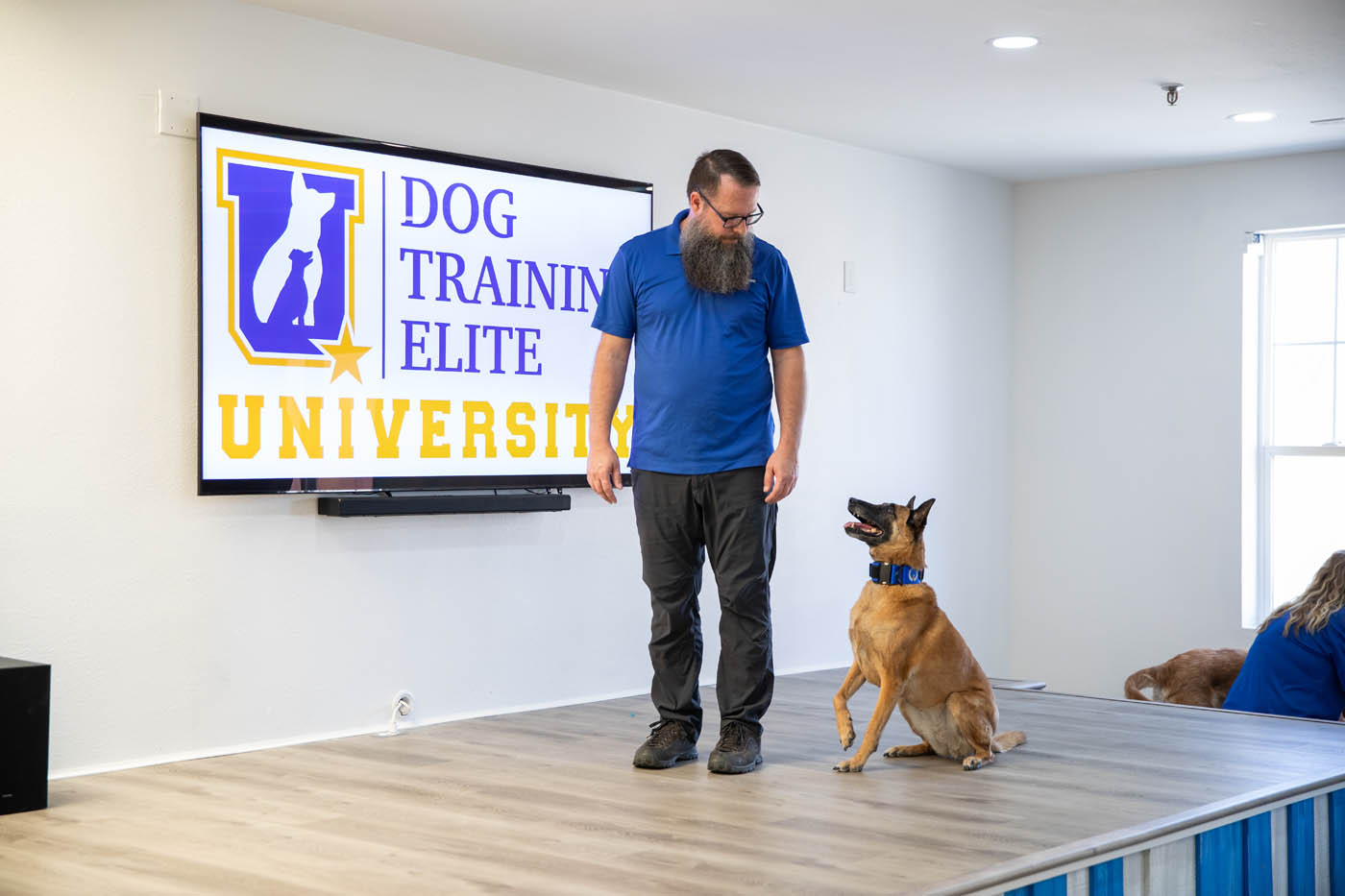Specialist Insights on Dog Training Charlotte NC: Change Your Puppy Today
Specialist Insights on Dog Training Charlotte NC: Change Your Puppy Today
Blog Article
Unlock Your Canine's Potential: Proven Pet Training Methods for Success
Effective pet dog training is a nuanced procedure that hinges on recognizing canine behavior and using scientifically backed approaches. By incorporating favorable reinforcement, developing clear commands, and prioritizing socializing, dog proprietors can grow an effective connection with their pet dogs.
Comprehending Pet Habits
Recognizing pet dog actions is necessary for effective training and promoting a favorable relationship between pets and their owners. A thorough grasp of canine body movement, vocalizations, and social communications is important for identifying their needs and emotions. Dogs connect largely via non-verbal cues; for instance, a wagging tail might show exhilaration, while pinned ears can signal fear or submission.

In addition, environmental aspects play a substantial duty in shaping a canine's behavior. Adjustments in regular, brand-new environments, or the presence of strange individuals can bring about tension or anxiousness in pet dogs. Recognizing these triggers allows proprietors to alleviate damaging reactions and create suitable training approaches.
Eventually, a deep understanding of dog habits lays the foundation for successful training techniques, boosting both behavior and the general bond in between the dog and its owner. Dog training. This understanding is crucial for promoting a well-adjusted, delighted canine companion
Positive Reinforcement Strategies
Effective training relies heavily on favorable support techniques, which have actually been revealed to generate significant results in forming wanted behaviors in canines. This approach includes awarding a pet for showing specific behaviors, consequently raising the chance that these behaviors will be repeated. Benefits can take different kinds, consisting of deals with, appreciation, playthings, or play, relying on what motivates the individual dog.

It is important to slowly phase out incentives as the pet dog learns the actions, transitioning to intermittent support. This strategy preserves the actions over time while stopping dependency on constant incentives. By concentrating on favorable support, trainers can grow a trusting partnership with their dogs, advertising a cooperative and healthy training setting that enhances general obedience and efficiency.
Establishing Constant Commands
A basic aspect of successful canine training is the facility of regular commands. Consistency in commands is vital for effective interaction in between the pet and the instructor. When commands are uniform, dogs learn to connect details words with desired habits, which increases the training procedure and enhances understanding.
To develop regular commands, it is essential that all family members use the same terminology and gestures. If one individual makes use of "rest" while an additional states "sit down," it can produce confusion for the dog. Select clear, distinct words for commands and ensure everyone involved in the dog's training sticks to these selections.
Enhance commands via regular practice, ensuring that the pet dog gets sufficient opportunities to react appropriately. When a pet dog successfully follows a command, prompt favorable reinforcement needs to follow.
Last but not least, hold your horses. Establishing consistent commands takes some time and effort. With commitment and clarity, you will certainly assist your pet establish a solid understanding of expectations, inevitably causing a mannerly companion.
Socializing and Exposure
Mingling a dog is necessary for fostering a well-adjusted and positive buddy. This procedure involves subjecting your pet to a variety of atmospheres, people, and various page other pets to develop their social abilities and adaptability. Early socializing, ideally between the ages of 3 to fourteen weeks, is important, as it click for more info prepares for a pet dog's future behavior.
Throughout socializing, aim to offer favorable experiences in various setups, such as parks, busy streets, and homes with other family pets. Present your canine to various stimuli, including noises, views, and scents, ensuring that each experience is gratifying. This exposure assists mitigate concern and stress and anxiety, leading the way for an extra resilient canine.
Participating in controlled group play sessions with other dogs can also boost social skills, showing your pet dog suitable communications and borders. Always monitor your canine's convenience degree throughout these experiences, slowly boosting direct exposure as their confidence grows. Keep in mind, the objective is to develop a well-rounded animal that prospers in varied scenarios, promoting an unified partnership with both human beings and various other animals. Prioritizing socialization will significantly add to your pet's total joy and habits throughout their life.
Conquering Common Training Obstacles

Another regular problem is disturbance. Pets may struggle to focus in hectic or unknown setups. Gradually desensitize your canine to diversions by beginning training in a silent setting and slowly introducing more stimuli as they end up being proficient (dog training near me). Positive reinforcement methods, such as deals with and appreciation, can preserve inspiration and emphasis.
Furthermore, behavioral concerns like leaping or extreme barking can end up being frustrating. Address these by teaching different actions, such as sitting calmly when welcoming visitors. Consistency and patience are crucial; enhance preferred behaviors continually and stay clear of scolding, which can lead to complication.
Finally, recognize that each pet is special, and training timelines may differ. Tailor your strategy to your pet dog's individual demands, and seek professional support service dog training near me if required. With perseverance and the appropriate techniques, overcoming these difficulties can lead to a trained, happy canine buddy.
Final Thought
Finally, opening a canine's possible necessitates a detailed method that incorporates an understanding of canine behavior, the application of favorable support techniques, and the establishment of regular commands. Early socializing and exposure to diverse settings even more enhance a dog's flexibility and self-confidence. By resolving common training difficulties with tailored methods and perseverance, a participating and unified relationship between pet and handler can be fostered, eventually causing a well-behaved companion qualified of growing in various situations.
Efficient pet training is a nuanced procedure that hinges on understanding canine habits and utilizing medically backed strategies.Understanding canine habits is crucial for effective training and fostering a positive relationship between canines and their proprietors.Efficient training counts greatly on favorable support strategies, which have actually been revealed to generate significant results in shaping preferred habits in pet dogs. When commands are consistent, pet dogs find out to link certain words with wanted habits, which speeds up the training procedure and improves understanding.
In final thought, unlocking a canine's prospective necessitates an extensive approach that incorporates an understanding of canine behavior, the application of favorable support methods, and the establishment of consistent commands.
Report this page